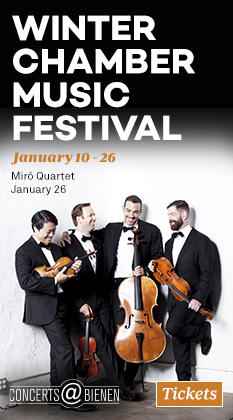From Shapey to bubble wrap and music for Chicago neighborhoods, the Ear Taxi Festival hits its eclectic stride
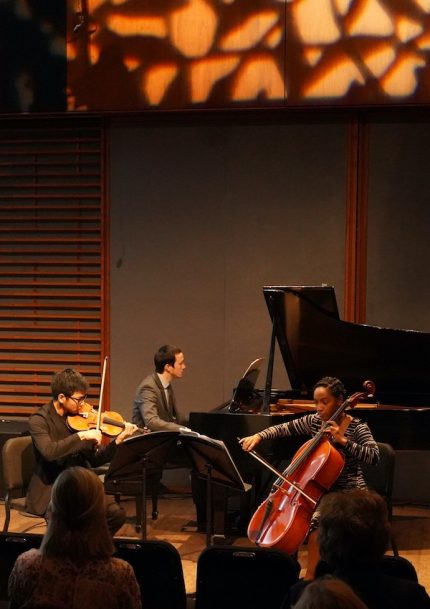
Day three of the Ear Taxi Festival’s Mainstage Series brought the moveable new-music feast to Hyde Park and the University of Chicago.
The Saturday afternoon sessions presented a plethora of eclectic, wildly varied sets from experimental sound installations to quasi-performance art and traditional chamber events. Over six hours it was striking how many excellent works were heard—a high batting average for any new-music festival—and nearly all were written by Chicago-based composers and having their world premieres.
More broadly, all concerts had an open and genuinely inclusive vibe. That friendly spirit is what these kind of events should be all about—a far cry from festival co-director Michael Lewanski’s dour, guilt-tripping manifesto on the festival website. (Among other things, he states that the American classical music industry “is among the most imperialist and oppressive fields in contemporary culture.”)
Happily, the actual performances embodied a more welcoming and optimistic atmosphere centered on the music at hand. Some events came off more successfully than others but all of Saturday’s performers tackled their assignments with extraordinary commitment and dedication. Nearly all events took place at the Logan Center Penthouse.
No event captured the best of what this kind of festival can offer more fully than the ambitious program by the Gaudete Brass. In a rich, musically packed 45 minutes, the brass quintet presented seven world premieres—all by Chicago composers and all inspired by a different city neighborhood.
Amos Gillespie’s finely crafted People in the Park (Rogers Park) segued from a stately Neo-Baroque ceremonial air to a buoyant march-like Allegro. Eric Malmquist’s Bordering Lines (West Ridge) offered a student-easy piece with pulsing lines and staccato accents growing into an affirmative trumpet fanfare.
Devin Clara Fanslow’s Fawn (Andersonville) moves artfully from antiphonal fanfares to stutter-step rhythms and an off-kilter Allegro. Ronnie Kuller’s LaBagh Woods (Albany Park) offered an antic waltz nicely contrasted against a somber secondary theme. Heidi Joosten’s Water’s Edge (Edgewater) mixed widely spaced electronic waves, a jaunty cantering theme and arhythmic foot-stomping. Regina Harris Baiocchi’s Pastiche (Brownsville) deftly blended edgy drive and wistful lyricism.
The most impressive item was Ephraim Champion’s South Shore. Champion was born and grew up in this South Side neighborhood and has crafted a strongly individual and compelling work. The music begins with a lovely lyrical trumpet theme with a bluesy edge, and the tempo accelerates as hectic riffs are thrown back and forth between the players. A motoric, syncopated theme leads to an elegiac passage; all the sections reprise, as the work closes in an affecting quiet coda. One looks forward to hearing more from this gifted young composer.
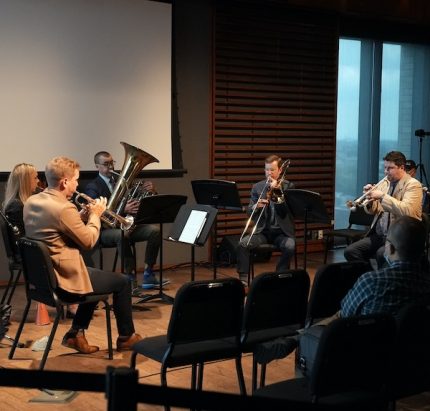
The Gaudete Brass performances were not technically immaculate but succeeded in capturing the unique voice of each composer. Kudos to Bill Baxtresser and Charles Russell Roberts, trumpets; Natalie Douglass, (substitute) horn; Paul Von Hoff, trombone; and Scott Tegge, tuba.
While nearly all of the day’s events centered on new music, the Avondale Trio’s set neatly bridged Hyde Park’s past and present. Organized by composer Ilya Levinson, the program offered the Piano Trio No. 1 by Ralph Shapey, UC’s longtime new-music guiding light and Levinson’s teacher. Completed and premiered in 1955, this is not only the work’s way-belated Chicago premiere but appears to be only its second performance—66 years after its San Francisco debut.
The 20-minute work is fully characteristic of the aggressive Shapey style that discombobulated his university colleagues and baffled listeners in the 1950s and 1960s. His uncompromising modernity even now can pack a punch—and the spiky rhythms, crashing chords, grinding dissonances, and sheer density of the writing drive relentlessly forward with barely any letup throughout the four movements. Violinist Kenichi Kiyama, cellist Kelsee Vandevall, and pianist Shi-An Costello deserve credit not only for their game, boldly projected performance but for the time and patience spent in making corrections to the score in order to present this local premiere.
Of the rest of Avondale’s set, Tim Edwards’ The Conjecture blends contemplative music with a sharply accented bite without losing an essential amiability. Levinson’s own “Branches” movement from his The Polyphony of Trees offers a lovely lyrical ode shaded with melancholy that later turns more pensive and shadowy. Both were played with sensitivity by the Avondale Trio, Levinson’s piece serendipitously complemented by the branch-like lighting.
Patricia Morehead offered a personal tribute to another former University of Chicago faculty member with her Sounds and Sighs for John. Inspired by her UC teacher John Eaton, the mix of Morehead’s wavery live oboe playing and populist music on backing electronics didn’t quite cohere but there was no doubting the sincerity of her heartfelt homage.
Three of the events inhabited a space closer to performance art than musical performance. Only one worked but that event provided a highlight of the afternoon.
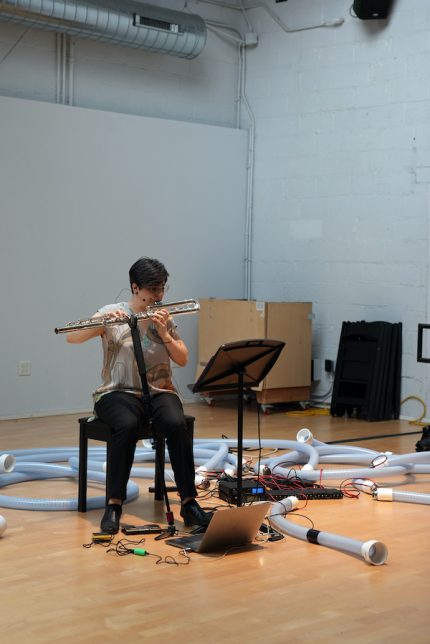
Shanna Pranaitis gave the world premiere of Jay Alan Yim’s The Rope Dancer Accompanies Herself with Her Shadows. Inspired by Man Ray’s 1916 painting of the same title, Yim’s piece mixes live bass flute performance within a sculptural sound installation. The flutist plays a notated score yet there is much room for improvisation; utilizing ten resonant tubes, the backing electronics provide a constantly shifting sonic bedding for the soloist.
With a packed room, the tight quarters of the Gray Center for Arts and Inquiry—a converted garage next to the Logan Center—didn’t allow listeners to walk around the space as advertised.
Even so, Pranaitis’s musicianship lifted the performance from being just a disparate collection of live and electronic sound effects. Playing nearly nonstop for 25 minutes, Pranaitis’s performance—enhanced by the plugged-in clouds, waves, swirls and eddies—was mesmerizing.
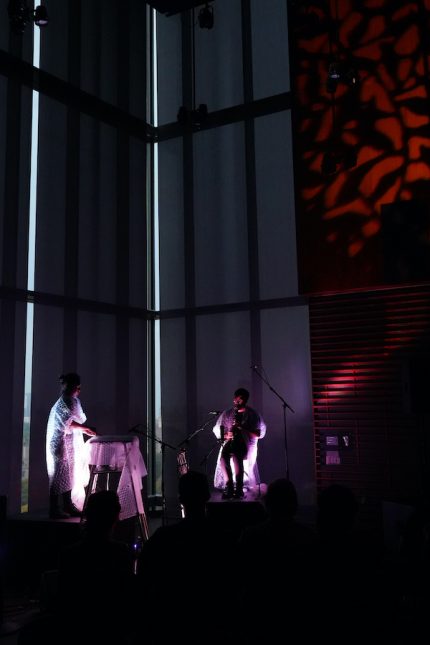
Considerably less successful was the world premiere of Up High by Zachary Good and Tonia Ko, which could have also been titled Adventures in Bubble Wrap. Anytime you walk into a darkened hall and the performers are positioned on high platforms wrapped in plastic bubble wrap, you know it’s going to be a long session. Good played low subterranean notes on amplified clarinet, bass clarinet and recorder while Ko rubbed, scratched and cut the plastic wrap, sounds converted into amplified electronic sound effects. Later they both silently dropped styrofoam packing chips on the floor while an array of loudly amplified dropped objects played on the speakers. For a grand finale both donned masks and walked up the center aisle popping their bubble wrap as audience members did the same with the wrap placed on each chair—a perhaps unintentional commentary on herd immunity. Or something.
The one outright turkey came from Tri-Again. Comprising oboe, trombone and piano, the trio’s series of short would-be comic vignettes consisted of standing silently in a circle passing around the oboe and trombone, backward tapes, mock-official Devo-like announcements and silly titles (“Oh God, There’s A Centipede”), etc. The group was clearly trying for Dadaist absurdity but the net result was painfully not funny and the half-hour set felt interminable.
______________
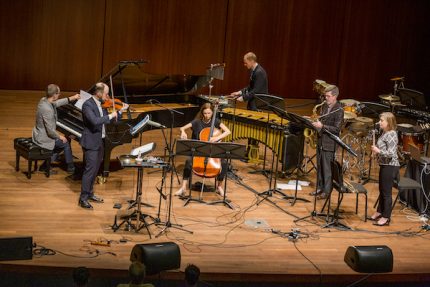
The crowning event Saturday was to be the evening performance of Wet Ink Ensemble—a co-presentation between Ear Taxi Festival, UC’s Chicago Center for Contemporary Composition (CCCC) and the first season event of UChicago Presents’ 2021-22 season.
The New York-based mixed ensemble (flute, saxophone, percussion, piano, violin, cello, electronics and voice) delivered a forceful virtuosity that was almost intimidating at times. Unfortunately, the four new works on the program offered decidedly mixed rewards.
First up was Ben Lamar Gay’s Known Better. Still Lit. The composer-cornetist joined the Wet Ink members in a work that served up cornet snarls, violin strands, and assorted noisy solos. The when-worlds-collide competing instrumental lines inevitably becomes a tinnitus-inducing extended cacophony. While there were arresting moments—not least pianist Eric Wubbels’ dizzyingly fast, jazz piano solo—Gay’s 25-minute work went on far too long for its slender virtues.
Suburbia by Maria Kaoutzani was heard in its world premiere. Hard percussion thwacks alternate with a softly seesawing violin solo, as the composer works a jumpy syncopated fast section against a hymn-like theme in an assured manner.
The other world premiere was Ted Moore’s aptly titled lacunae. A serpentine flute solo segues into elliptical lines and breathy flute noises. (Do composers ever tire of this overused device?). Electronic squiggles and fragmented violin phrases lead into more aggressive cacophony. Moore’s work ultimately is another exercise in sound and fury signifying not so much.
So Many Ways by ensemble sax player Alex Mincek began in more compelling fashion. Spare, widely spaced prepared piano notes lead into gentle flute and sax notes. Singing an unidentified text, Kate Soper’s soprano is used as another instrumental color rather than as a front soloist yet her pure, soothing voice—even in her patented sprechtimme—felt like a glowing benediction compared to the sonic assault of the preceding works. Unfortunately, Mincek’s work likewise seems to lose the thread in the second half as the tempo ramps up and the volume increases. It’s also quite possible that after eight hours of close listening, one’s ears inevitably get a bit weary.
Still, the Wet Ink musicians’ polish and volatile bravura were never in doubt, and one looks forward to a future visit with music that will show off their daunting skills to better effect.
The Ear Taxi Festival continues through Monday. Eartaxifestival.com.
UChicago Presents’ next event is Susan Graham and Music from Copland House 7:30 p.m. Friday at Mandel Hall. chicagopresents.uchicago.edu
Posted in Performances
